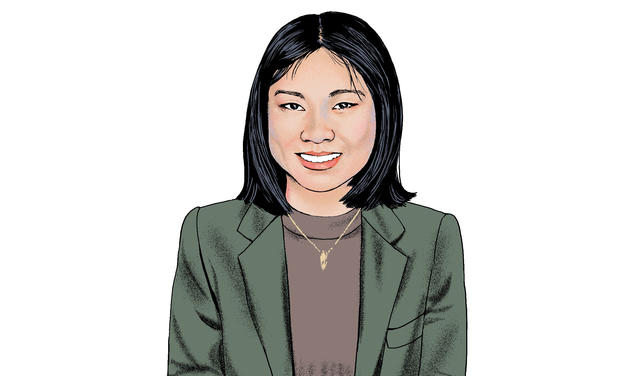
At the Supreme Court, Justice Sonia Sotomayor ’76 works in a cocoon of marble and tradition where she is treated with solemn deference by the nation’s top lawyers. At Princeton, she got a locomotive.
“Sonia! Sonia! Sonia!” her fellow alumnae chanted at Jadwin Gymnasium, where Sotomayor held forth in an hour-long conversation with President Tilghman at the “She Roars” conference. It was her warm, unostentatious personality, more than the august nature of her high office, that captivated the audience as Sotomayor, the court’s third woman and first Latina justice, traced her improbable odyssey from New York City’s public housing projects to the privileged precincts of Princeton and the nation’s highest court.
Sotomayor, who told senators at her confirmation hearings that the TV series Perry Mason inspired her to become a lawyer, said another pop-culture icon set her on the path to Princeton. In high school in the Bronx, she said, “I didn’t know what an Ivy League college was.” But then came the 1970 movie Love Story, about a romance between Harvard students. “I saw the university on the screen and I thought to myself, what a magical-looking place,” she said.
Sotomayor got into every Ivy League school to which she applied. At Harvard, she said, she was intimidated by a meeting with an admission officer who invited her into an office featuring a white sofa (in her neighborhood, she said, all the sofas were covered in plastic), an oriental carpet, and two yapping toy poodles. “I fled,” she said. At Yale, she was invited to join an anti-war protest — an off-putting experience for the Catholic high school girl who described herself as “a rule-follower.” At Princeton, Sotomayor’s high school friend Ken Moy ’75 introduced her to students who, she recalled, assured her that she could make it. The campus helped too: “This looked like Love Story,” she said.
Becoming a Supreme Court justice was no less stressful. The weekend before President Obama nominated her, she said, she was peppered with calls from the White House asking her for information but always accompanied by the caveat that the president had not yet made up his mind. At one point, she was asked to write an acceptance speech “just in case.” At another, she was told to arrange to fly family members to Washington — and cautioned that if the president chose someone else, “we will send them back.” After her brother bought new suits for his twin sons to wear, Sotomayor called to warn him: “Don’t take the price tags off.”
Sotomayor said she has endured subtle discrimination throughout her career in the form of dismissive attitudes or lack of deference from colleagues. She warned younger alumnae that such bias has not been eliminated entirely. It “can be demoralizing,” she warned younger alumnae, telling them, “it should not undermine your confidence in yourself.”
One of three sitting female justices, Sotomayor said there’s still progress to be made. She described a conversation she witnessed after the swearing in of Justice Elena Kagan ’81, when President Obama asked Ruth Bader Ginsburg, the court’s senior woman, if she were happy that “I gave you two sisters.”










0 Responses